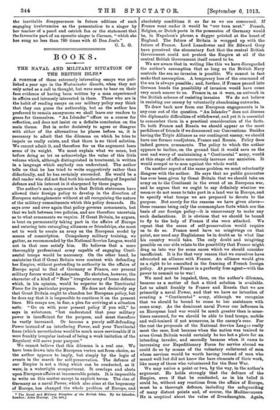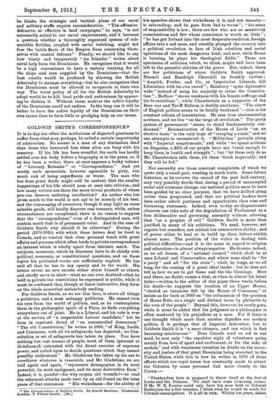BOOKS.
THE NAVAL AND MILITARY SITUATION OF THE BRITISH ISLES.* A PORTION of these extremely interesting essays was pub- lished a year ago in the TVestminster Gazette, when they not only acted as a call to thought, but were seen to bear on their face evidence of having been written by a man experienced in affairs and intensely interested in them. Those who are in the habit of reading essays on our military policy may think that they can guess the authorship, but as the author has preferred to remain anonymous we shall leave our readers to guess for themselves. "An Islander" offers us a course for reflection, and does not insist on a definite conclusion on the main theme. But in order decisively to agree or disagree with either of the alternatives he places before us, it is necessary to admit that the dilemma on which he tries to impale us really exists, and that there is no third solution. We cannot admit it, and therefore for us the argument loses some of its weight. We must explain what we mean, but before doing so let us acknowledge the value of this little volume which, although distinguished in treatment, is written in a language which anybody can understand. The author tells us that he has tried to write suggestively rather than didactically, and he has certainly succeeded. He would be a dull reader who did not find both his understanding of Imperial defence and his interest in it sharpened by these pages.
The author's main argument is that British statesmen have
allowed their foreign policy to develop in the direction of European entanglements without at all recognizing the nature of the military commitments which this policy demands. He says over and over again that policy governs armaments, but that we halt between two policies, and are therefore uncertain as to what armaments we require. If Great Britain, he argues, is bent on permanently taking part in the affairs of Europe and entering into entangling alliances or friendships, she must set to work to create an army on the European model by means of conscription. Compulsory military training, we gather, as recommended by the National Service League, would not in that case satisfy him. He believes that a more thoroughly professional army capable of engaging Conti- nental troops would be necessary. On the other hand, he maintains that if Great Britain were content with defending her Empire, without pretending to authority in the affairs of Europe equal to that of Germany or France, our present military forces would be adequate. He sketches, however, the character of a kind of "Boer " irregular army of home defence which, in his opinion, would be superior to the Territorial Force for its particular purpose. He does not decisively say that Great Britain ought to abandon her European policy, but he does say that it is impossible to continue it on the present lines. His essays are, in fine, a plea for arriving at a situation " Go on with your present policy if you will," he says in substance, "but understand that your military power is insufficient for the purpose, and must therefore be vastly increased. Or become a purely self-defending Power instead of an interfering Power, and your Territorial force (which nevertheless would be much more serviceable if it were frankly irregular instead of being a weak imitation of the Regulars) will serve your purpose."
We cannot believe that this dilemma is a real one. We have been drawn into the European vortex not from choice, as the author appears to imply, but simply by the logic of events in the search for self-preservation. The defence of our Empire is not a thing which can be conducted, as it were, in a watertight compartment. It overlaps and abuts upon European affairs at innumerable points. It is impossible to write on this matter except in explicit terms. The rise of Germany as a naval Power, which also aims at the hegemony of Europe, has changed the whole problem of Europe, and
• The Nasal and Military Situation of the British Isles. By An Islander. London: John Murray. [le. net.]
absolutely conditions it so far as we are concerned. If France went under it would be " our turn next." French, Belgian, or Dutch ports in the possession of Germany would be, in Napoleon's phrase, a dagger pointed at the heart of England. The future of Britain is wrapped up with the future of France. Lord Lansdowne and Sir Edward Grey have perceived the elementary fact that the central British Government could not protect the Empire at all if the central British Government itself ceased to be.
We are aware that in writing like this we have disregarded the author's assumption that so long as the British Navy controls the sea no invasion is possible. We cannot in fact make that assumption. A temporary loss of the command of the sea is always possible ; and, further, if France passed into German hands the possibility of invasion would have come very much nearer to us. France is, as it were, an outwork in the British scheme of resisting invasion We do not believe in resisting our enemy by voluntarily abandoning outworks.
To draw back now from our European engagements is in any case out of the question. "An Islander" does not discuss the diplomatic difficulties of withdrawal, and yet it is essential to remember them in a practical consideration of the facts. To both France and Russia we should appear as the most perfidious of friends if we denounced our Conventions. Besides having the Triple Alliance as our contingent enemy, we should have our former coadjutors, France and Russia. Policy does indeed govern armaments. The policy to which the author appears to incline, on the ground that it would save us the cost and worry of maintaining a " Continental " army, would at this stage of affairs enormously increase our anxieties. It would compel us to arm against the whole world.
On another aspect of the same problem we must reluctantly disagree with the author. He says that no public guarantee has ever been given by Great Britain that we should take an army on to the Continent in the event of an European war, and he argues that we ought to say definitely whether we mean or do not mean to take part in a land war in Europe, and
to specify what troops we are prepared to devote to the purpose. But surely for the reasons- we have given above—
these reasons being only the commonplace facts which are the basis of our foreign policy—it is unnecessary to make any such declarations. It is obvious that we should be bound to fly to the help of France if she were attacked. We repeat that the sense of self-preservation would require us to do so. France need have no misgivings on that point, nor need any Englishman be in doubt as to what line his country would take. The only doubt and misgiving possible on our side relate to the possibility that France might drag us into war for some cause which we should consider
insufficient. It is for that very reason that we ourselves have advocated an alliance with France. An alliance would give-
us a right to be consulted in the framing of French foreign policy. At present France is a perfectly free agent—with the power to commit us to war !
We need not be impaled, then, on the author's dilemma,. because as a matter of fact a third solution is available.
Let us admit frankly to France and Russia that we are primarily a naval Power, and that we have no intention of creating a " Continental" army, although we recognize that we should be bound to come to her assistance with some army. As the dominant naval Power our influence in an European land war would be much greater than is some- times assumed, for we should be able to land troops, mobile and well-trained if not numerous, in the enemy's rear. For the rest the proposals of the National Service League really meet the case, first because when the nation was trained to arms Great Britain would certainly be too hot a, place for an intending invader, and secondly because when it came to increasing our Expeditionary Force for service abroad we could do so by means of the voluntary enlistment of men whose services would be worth having instead of men who meant well but did not know the bare elements of their work, like many of those who volunteered for the Boer War.
We may notice a point or two, by the way, in the author's argument. He holds strongly that the defence of the Empire, even if that be conducted, as in his belief it could be, without any reactions from the affairs of Europe, must be a thorough defence, including the safeguarding of many distant points and, of course, the Mediterranean He is sceptical about the value of Dreadnoughts. Again, be thinks the strategic and tactical plans of our naval and military staffs require reconsideration.. " The offensive- defensive, so effective in land campaigns,". he .says, "is not necessarily suited to our naval requirements, and it becomes a question whether a • thoroughly organized system of sub mereible flotillas, coupled with aerial 'watching, might not free the battle fleets of the Empire from concerning them- selves with coastal defence." Finally; we should like to say how wisely and temperately "An Islander" writes about naval help from the Dominions. He recognizes that it would be a high convenience to have a 'unitary training for all the ships and men supplied by 'the Dominions—that the best results would be produced by allowing the British Admiralty to manage everything—but he also recognizes that the Dominions must be allowed to co-operate in their own way. The worst policy of all for the British Admiralty to adopt would be to kill local pride and enthusiasm by appear- ing to disdain it. Without these motives the active loyalty of the Dominions could not endure. Lathe long run it will be better to have the active loyalty of the Dominions on their own terms than to have little or grudging help on our terms.







































 Previous page
Previous page